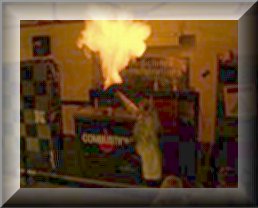 Yours,
Steve E. Williams
Rock Star and Science Demonstrator
Pacific Science Center, Seattle, Washington, USA
Yours,
Steve E. Williams
Rock Star and Science Demonstrator
Pacific Science Center, Seattle, Washington, USA
| MadSci Network: Chemistry |
Hi Nicole! Here's the short answer: Yes. Red cabbage and water make what we like to call an Indicator. Specifically, you are making an acid/base indicator, or a pH indicator. More on this later. Let's get to some recipes: Paraphrased from B. Z. Shakhashiri, 1989, Chemical Demonstrations: A Handbook for Teachers of Chemistry, vol. 3, pp 162-166. ingredients: Red Cabbage (RED cabbage!) Blender or Grater (like a cheese grater) Hot or Boiling Water Big Jar Coffee Filter Ok, here's a couple ways to do it: Method 1 -- Prepare some boiling hot water. It goes without saying you should have an adult around to assist you with this. Take the cabbage and put it in a big bowl or jar, and cover it with boiling water. Wait ten minutes (the longer the better)...and pour the purplish/red mixture through the coffee filter into a big jar. Instant pH indicator! Method 2 -- Blend or grate 2 cups red cabbage, and put it in some boiling water. Turn off the heat to the water and let it sit for 10 minutes or more (the longer the better). Filter it through a coffee filter. If you use Method 1, you will want to have quite a bit of cabbage (like a half a head or maybe a bit less). If you use Method 2, use about two cups of grated cabbage. Incidentally, right here on madsci.com in our Edible/Inedible Experiments lab, we have a similar experiment to what you propose. Here's it's web site address: CabbageJ uice - pH indicator Now, what you are doing is taking this whole neat bit of science one step further from the experiment on the web site. At the Pacific Science Center I use a similar experiment to determine who has "bad breath". It's the same thing you are going to do in your experiment! You will be creating an acid with your breath, which contains carbon dioxide! We know it's carbon dioxide that does this because oxygen, nitrogen and argon (the main parts of our air) will NOT form an acid in water. Carbon dioxide, however, forms Carboxylic acid in water, by mixing with the water molecules. Your experiment will (I'm certain) prove this point, by causing a dramatic color change in your cabbage indicator solution. I wish you all the best in this. If you want to discuss this more, or if you have a follow-up question, feel free to write us or myself personally at steve_williams@pacsci.org.Yours, Steve E. Williams Rock Star and Science Demonstrator Pacific Science Center, Seattle, Washington, USA
Try the links in the MadSci Library for more information on Chemistry.